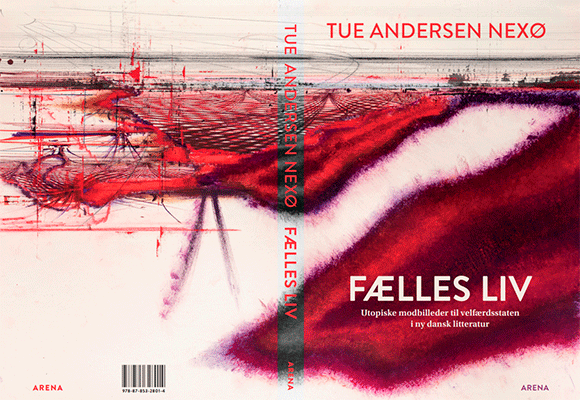
Excluded from a life as an equal citizen
A new book written by a former fellow at the Nordic Humanities Center describes a wave of young writers giving voice to socially marginalised groups in the welfare state. The book is called "Fælles liv" and is written by literary scholar Tue Andersen Nexø.
Can life be lived according to norms that are completely different from those set by the welfare state?
Yes, indeed, if you take a closer look at the works of young authors such as Asta Olivia Nordenhof, Luka Holmegaard or Malte Tellerup, who, according to associate professor of literature Tue Andersen Nexø, are part of the same clear trend. According to him, a recurring pattern among the authors is that in their novels and poems they provide counter-images of how we can live a "common life". A life that does not live up to society's demands for economic productivity.
Don't envy the overworked
- A distinctive feature is that many of them describe a life where they are not subject to society's strict demands for productivity and earnings. Where there is room for a kind of lavishness with human surplus, where you are ready to give to others. In her poetry collection "Det nemme og det ensomme" from 2013, Anna Olivia Nordenhof describes how she walks on Amager Fælled and doesn't at all envy all those who rush around in the metro, says Tue Andersen Nexø.Wave of literature written with special sensitivity

Watch video of Tue Andersen Nexø in conversation with young writers. Admissions from the Centre for Art and Mental Health in Copenhagen.
”A distinctive feature is that many of them describe a life where they are not subject to society's strict demands for productivity and earnings.
One of the most obvious debates in Denmark about a meaningful life has arisen in the wake of the book "Ærø Manifestet" by Maj My Humaidan. The book, subtitled "On the longing for a different family life", is about the choice to pull your children out of school and kindergarten in Copenhagen and move to a part of the country where life feels simpler. The protagonist and his friends make the same move in Malte Tellerup's novel "Hedeselskabet" from 2020, which is one of the works Tue Andersen Nexø has scrutinised.
Outside the confines of the welfare state
Is there a tendency to believe that moving out of Copenhagen is the way to the good life?- Moving out of Copenhagen becomes a symbol of rejecting a life that is dependent on a large salary income. If you want to afford life in the city, you are a slave to a certain economic turnover.
A common theme among many of the young writers is that they feel sorry for others. They have seen a more meaningful life outside the tight confines of the welfare state. Some are unable to hold down a steady job due to mental illness, but on the other hand - as seen with authors such as Fine Gråbøl or Anna Rieder - they suddenly find that institutions create very rewarding communities that would not have arisen in "ordinary" life," says Tue Andersen Nexø.

Authors are a kind of seismograph
Tue Andersen Nexø wrote the book "Fælles liv" while part of a research group at the Nordic Humanities Centre that examined the relationship between the individual and the welfare state. They described the concept of "welfare rage", which apparently stems from a feeling of disappointment among parts of the population that "the welfare state does too little". And it is perhaps part of the same feeling that the young authors are writing about.
Why should we take note and spend time with these writers?
- Firstly, because they write incredibly good books," says Tue Andersen Nexø, "but also because of the idea that writers are a kind of seismograph. They feel the tremors of our time and what it's like to be human. Both the obvious pressure in relation to what appears to be "the good life", and at the same time they recognise the disillusionment that - some would say - also runs like a current under society," says Tue Andersen Nexø.
The book "Fælles liv - Utopiske modbilleder til velfærdsstaten i ny dansk litteratur" is published with support from the A. P. Møller Foundation and published by Arena.